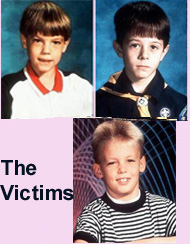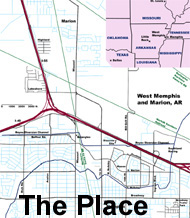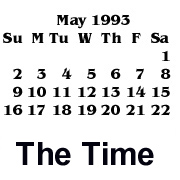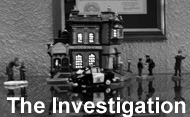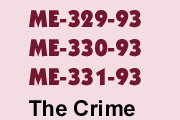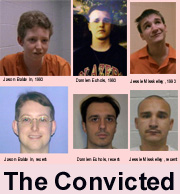Jivepuppi.com

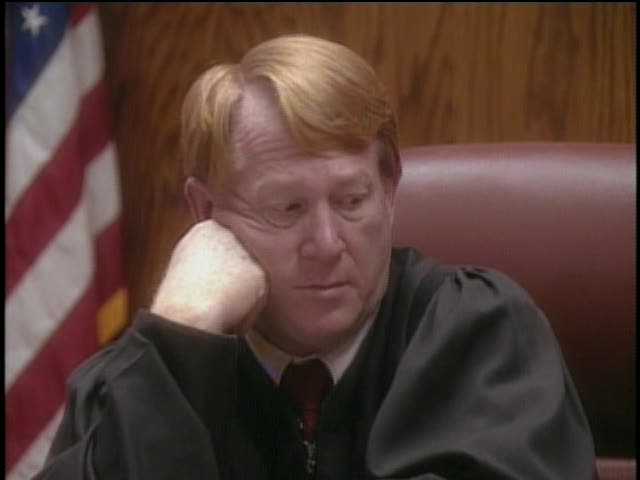
Judge David Burnett
A Twilight Kill, Part Six: Judge
David Burnett
We live in the illusion that these are modern
times.
We maintain a belief that the accused have rights and can obtain the
semblance of a fair trial. Up until 1993, the maximum reimbursement an
Arkansas lawyer could receive from the state for representing an
indigent client, even one faced with the death penalty, even if the
lawyer was assigned to a case against his will, was $100. This allowed
the authorities and prosecutors an easy job of assembly line justice,
with the court-appointed attorneys often happy or desperate to wash
their hands of their clients. Although this cap was removed shortly
before this case, the system had yet to adjust. All three defendants
were indigent and reliant on state appointed attorneys.
The trials were presided over by Judge David
Burnett. In his mid-forties, with fine red hair, his elbow often
leaning on the bench, his chin propped up by his hand, he presented a
world-weary look. Derisively referred to by some of the West Memphis
Police as the "Circus Court Judge," he let his prejudices be
known.
Burnett:
I understand that there is some subtle difference between the Wiccans
and the occult. But, now what it is, I couldn't tell you. But what I've
read in the newspaper that they - one disavows the other, whatever that
means.
[later]
Burnett:
I hate to dignify it by
calling it "occult testimony," but that the testimony relative to Wicca
religion can only be considered for Mr. Echols. If I'm right. What is
Wicca, does anybody..? [Judge David Burnett, in limine hearing
during Ridge testimony, Echols/Baldwin trial]
The trials were divided in two, with Misskelley
tried first and alone. His trial began on January 26, 1994, a day
before the return of the full moon. The prosecution presented a string
of
witnesses
attesting to "negative evidence." There was no blood at the crime
scene. There was no physical evidence linking Misskelley to the crimes.
A mold was made of a shoeprint at the scene - but its size didn't match
Misskelley or any of the defendants. The bruises could have been caused
by sticks or any blunt instrument. The cuts could have been caused by
any sort of knife. There was no evidence the children were sodomized or
that any had been choked.
But the prosecution did have Misskelley's tape
recorded confession. The jury heard him say, "I was there" and "the
other one took off, Michael Moore took off running and I chased him and
grabbed him and held him til they got there and then I left."
[Misskelley taped confession, June 3, 1993] The
latter statement was Misskelley's only admission to participating in
the crime.
Misskelley's lawyers tried desperately to explain
why Misskelley confessed. They presented two experts with impressive
credentials. Warren Holmes, who volunteered his time, was a
specialist in interrogation who had worked on over 1200 murder cases
for the government, including the assassinations of John F. Kennedy and
Martin Luther King, Jr. An expert in polygraph, he examined Misskelley
test results and declared the only lie was when Misskelley denied using
drugs.
Dr. Richard Ofshe was a professor of sociology at
Berkeley with his PhD from Stanford. He had researched the
psychological and sociological methods of persuasion for thirty years,
had published five books and numerous articles, and had won the
Pulitzer Prize for assisting in the investigation of mind-control
tactics of Synanon. In the recent past, he had specialized in false
confessions.
The prosecution responded by ridiculing these
experts and their credentials.
Fogleman: Then we get to Mr.
Ofshe or Dr. Ofshe, as, whichever one you prefer.
But Dr. Ofshe or Mr. Ofshe, he can't treat a broken arm, he can't treat
your mind, he's not a licensed psychologist, you can't be licensed as a
social psychologist. [snip] Just because you come in with a lot of
degrees and a Pulitzer Prize. [snip] He's from Berkeley, California and
he came and put on a show. [Fogleman closing arguments, Misskelley
trial]
At the time the prosecution rested its case, the
West Memphis Evening Times ran a story saying, "... the family members
sat
perplexed as the prosecution presented a procession of expert witnesses
who testified that a battery of tests on hair, cloth fibers and other
items failed to produce any physical evidence linking the accused to
the crime. 'Maybe it's their technique or whatever you want to call it,
but I didn't see no logic in it,' [Terry] Hobbs said." [The West
Memphis Evening Times January 31, 1994]
Misskelley's tape recorded confession with all of
its inaccuracies swayed the jury. He was sentenced to 99 years plus
life.
Continued in, A Twilight Kill, Part Seven: Dangerous Numbers



